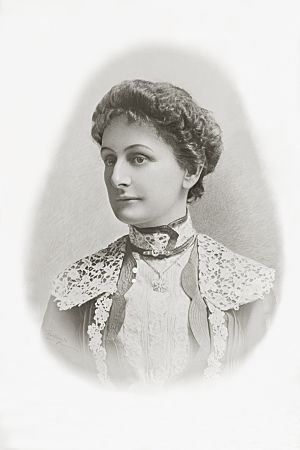Bella Guerin facts for kids
Julia Margaret Guerin Halloran Lavender (born April 23, 1858, in Williamstown, Victoria – died July 26, 1923, in Adelaide, South Australia), known as Bella Guerin, was an important Australian woman. She was a feminist who believed in equal rights for women. She also fought for women's right to vote, spoke out against war, and was a schoolteacher.
Contents
Early Life and Education
Bella Guerin was born in Williamstown, Victoria, on April 23, 1858. Her parents, Julia Margaret and Patrick Guerin, were from Ireland. Her father worked in prisons and became a governor of gaols.
Bella studied at home and passed her university entrance exams in 1878. She then made history by becoming the first woman to graduate from an Australian university. She earned her Bachelor of Arts degree from the University of Melbourne in December 1883. She later received her Master of Arts degree in 1885.
Career and Activism
Teaching Career
After graduating, Bella Guerin became a teacher. She first taught at Loreto College, Victoria. She strongly believed that Catholic girls should get scholarships for higher education. She wanted to help create "a band of noble thoughtful women" who could make a positive difference in the world.
In 1891, Bella married Henry Halloran, a civil servant and poet. He was much older than her and had written a poem praising her after seeing her graduation photo. Henry died in 1893, leaving Bella with their young son, Henry Marco.
Bella returned to teaching because she needed money. She taught in different places like Sydney and Melbourne. In the late 1890s, she became involved with groups that supported women's right to vote. She was an important member of the Bendigo Women's Franchise League. She also ran University College, Bendigo from 1898 to 1903.
From 1904 to 1917, she continued teaching in various schools around Melbourne. Her growing involvement in politics and disagreements with the Education Department about working conditions likely affected her teaching career.
Fighting for Women's Rights
From 1912 to 1914, Bella Guerin was a vice-president of the Women's Political Association. She worked with Vida Goldstein, another famous women's rights activist. Bella helped write a pamphlet for Vida's Senate election campaign in 1913. However, it became difficult for her to be a member of both a women's rights group and a political party at the same time.
From 1914, Bella started writing and speaking for the Labor Party and other socialist groups. She was known for being a "witty, cogent and instructive" speaker. She talked about many important social issues. These included the rights of children born outside of marriage and the idea of "brotherhood and sisterhood without sex distinction." She also defended English women who were fighting for the right to vote.
Speaking Out Against War
Bella Guerin was a strong opponent of war. She led a campaign against conscription (forcing people to join the army) during the 1916 referendum. She traveled to different cities and towns, speaking out against militarism. She also defended people's rights to gather and speak freely.
Involvement in Politics
In March 1918, Bella became a vice-president of the Australian Labor Party's Women's Central Organizing Committee. She caused some debate by saying that women in the Labor Party were not given enough power. She felt they were mostly used for fundraising and not included in important decisions. After this, she focused on working with the Labor Party only when it supported her socialist beliefs. She believed in the parliamentary system but wanted to end capitalism.
Beliefs and Personality
Bella Guerin changed her religious views from Roman Catholicism to rationalism, which means she relied on reason and logic. She described her own political journey as changing from someone who supported the British Empire to someone who believed in democracy. She often faced challenges as a socialist feminist within the Labor Party.
Her son, who became a doctor, described her as "the kindest and most gentle of women." Bella saw herself as a "national idealist" and a "militant" who never gave up. She wanted to encourage women to take part in public life. People thought she was a very talented speaker.
Bella Guerin passed away in Adelaide on July 26, 1923, at the age of 65. She was buried in the Catholic cemetery at West Terrace.
Legacy
Bella Guerin spent time teaching in Ballarat. Because of this, the University of Ballarat (now called Federation University Australia) honored her. They named one of their student dorms at the Mt Helen campus after her. The other dorm is named after Peter Lalor, who led the Eureka Stockade in Ballarat.
There is also a place called Guerin Place in the Canberra suburb of Chisholm, named in her honor.
See also
 In Spanish: Bella Guerin para niños
In Spanish: Bella Guerin para niños


